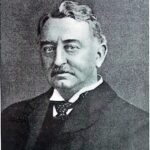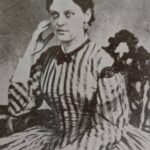MOMO JA
- 4 Min Read
Momo Ja (late 1840s-early 1900s) was a famous warrior and ruler in the far south of Sierra Leone, who, together with his older brother Momo Kai Kai, controlled the country around Pujehun on the Wanje River. He initially resisted the British over the collection of hut tax, but later assisted them in sup-pressing the insurrection of 1898.

PHOTO CAPTION: Momo Ja SOURCE: EA Library
Born in about the late 1840s, he was the son of a Fula father and a Mende mother. Both he and his brother were warriors, Momo Ja being the commander of his brother’s forces whose permanent encampment came to be known as Pujehun, meaning literally “in the pepper,” for it was such a hot spot that even the brave were afraid to attack it. By the last quarter of the 19th century, Momo Ja and Momo Kai Kai had established their domination over the Kittam region south of the Bum River. Momo Ja had established his own center of political power by building the town of Sembehun, in Pujehun district.
In 1889 Governor Sir James Shaw Hay (term of office 1888-91) initiated a “greatly extended policy” towards the interior of the country with a triple emphasis on road building, policing, and a rapid increase in treaty-making in preparation for the impending Protectorate. Hay visited the Gallinas and Kittam regions in 1890 to explain his policy to the local rulers who agreed to start work on road-making at once, after false assurances that it was not with any intention of taking over control of their country. He asked Momo Kai Kai to rebuild his town of Bandajuma, to the north of Pujehun, which had been destroyed in recent wars, and to build a block house to quarter police. Kai Kai delegated this project to Momo Ja, whose enthusiasm for Hay’s new policy got the work completed in four weeks.
In 1888 a “standard treaty” had been prepared by the colonial government, which, apart from a restrictive clause preventing cession of territory to any other foreign power, was still a treaty of friendship. This started a boom of treaty-making with local chiefs, which Hay personally administered in the middle Mende belt. Alter persuading many important rulers to sign treaties at a large assemblage at Tikonko on the Bum River, Hay was accompanied by Momo Ja, Makavoray, and other chiefs of significance, to meet Bumpe rulers, who presented a firm barrier against British penetration. The mission, to convince them to sign similar treaties, was successful.
When the Protectorate Ordinance was proclaimed in 1896, Momo Ja, together with various other rulers, decided to see Governor Frederic Cardew in person to clarify certain of the provisions. They were at first refused an audience, but Cardew changed his mind and invited their presence. Momo Ja, however, declined. The other rulers were told by Cardew that they would have to pay house tax, a highly contentious matter, whether they liked it or not.
When the collection of the tax began in Bandajuma district, extorted by brutal methods by the Frontier Police, Momo Ja refused to pay. District Commissioner Carr ordered a sergeant and 20 Frontier Police to arrest him and sentenced him to three month’s imprisonment with hard labour for non-payment of the tax. Shortly after, he paid up, and the remaining sentence was rescinded. Thereafter Momo Ja sided with the British, providing military help to suppress the resistance of 1898. Captain Carr recommended him for a present of £10 for his services, which was approved by the governor. He then seems to have reverted largely to trade, from which he grew prosperous, his chief town of Pujehun being ideally located on the Wanje River.
In 1897 he was recognised as paramount chief of lower Krim country, in the Pujehun district. It was thought in official circles that he might even succeed Momo Kai Kai, who was by now very old, as paramount chief of Malene chiefdom, also in Pujehun. Momo Ja probably died early in this century.
ARTHUR ABRAHAM




